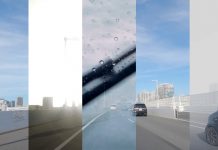California will allow the testing and commercial use of light-duty autonomous delivery vehicles on the state’s public roads with an approved permit from the Department of Motor Vehicles.
Under revised regulations approved, companies with a DMV permit can operate autonomous delivery vehicles weighing less than 10,001 pounds. The DMV can begin approving new applications in 30 days. Qualifying vehicles include autonomous passenger cars, midsized pickup trucks and cargo vans carrying goods such as pizza or groceries. Autonomous delivery vehicles will be required to comply with the same application requirements currently in place for testing and deployment of autonomous passenger vehicles. Depending on the permit, companies can test their autonomous delivery service with or without a safety driver. Companies must apply for a deployment (commercial use) permit with the DMV to charge a delivery fee.
Previously, DMV regulations did not allow for the testing and commercial use of autonomous light-duty delivery vehicles on public roadways. The DMV’s regulations continue to exclude autonomous vehicles weighing more than 10,001 pounds.
Requirements for Testing with a Driver include:
- Certify the test vehicles have been tested under controlled conditions that simulate the operational design domain (driving environment) in which the vehicle is intended to operate.
- Maintain a training program for test drivers and certify that each test driver has completed the training.
- Ensure that test drivers maintain a clean driving record.
- Ensure that test drivers are seated in the driver’s seat during testing, monitoring the vehicle’s operation, and capable of taking over immediate manual control of the vehicle as needed.
- Submit an annual disengagement report and submit collision reports to the DMV within 10 days.
Requirements for Driverless Testing include:
- Certify that local authorities, where vehicles will be tested, have been provided written notification.
- Certify the autonomous test vehicle complies with requirements that include a communication link between the vehicle and remote operator, a process to communicate between the vehicle and law enforcement, and an explanation of how the manufacturer will monitor test vehicles.
- Submit a copy of a law enforcement interaction plan.
- Certify the autonomous test vehicle meets all Federal Motor Vehicle Safety Standards (FMVSS) or provide evidence of an exemption from the National Highway Traffic Safety Administration (NHTSA).
- Certify the autonomous test vehicle is capable of operating without the presence of a driver and meets the autonomous technology description of a Level 4 or Level 5 under the Society of Automotive Engineers (SAE) definitions.
- Certify the test vehicles have been tested under controlled conditions that simulate the operational design domain (driving environment) in which the vehicle is intended to operate.
- Inform the DMV of the intended operational design domains.
- Maintain a training program for remote operations and certify each operator has completed training.
- Submit an annual disengagement report and submit collision reports to the DMV within 10 days.
Requirements for Deployment (Public Use) include:
- Certify the vehicle is equipped with an autonomous vehicle data recorder, the technology is designed to detect and respond to roadway situations in compliance with California Vehicle Code, and the vehicle complies with all FMVSS or provide evidence of an exemption from NHTSA.
- Certify the vehicle meets current industry standards to help defend against, detect and respond to cyber-attacks, unauthorized intrusions or false vehicle control commands.
- Certify the manufacturer has conducted test and validation methods and is satisfied the vehicle is safe for deployment on public roads.
- Submit a copy of a law enforcement interaction plan.
- If the vehicle does not require a driver, the manufacturer must also certify to other requirements, including a communication link between the vehicle and a remote operator and the ability to display or transfer vehicle owner or operator information in the event of a collision.
In developing and adopting this rulemaking, the DMV followed the same approach used for past AV regulations packages, including a public workshop and hearing.
Currently, 65 companies have valid permits to test autonomous vehicles with a safety driver on California public roadways. One company has a permit for driverless testing.














